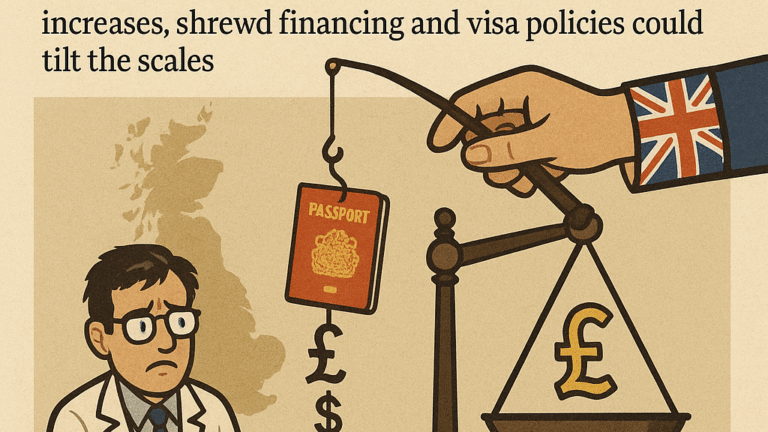A Gathering of World Changes
Britain is in a unique position of advantage in a time marked by digital innovation, pandemic-induced flexibility, and growing discontent among American professionals. The UK may take advantage of the fact that American workers are reassessing their priorities in order to pursue professional possibilities overseas, cultural enrichment, and a better work-life balance.
Once seen as inward-looking, the UK has the opportunity to reinvent itself as a global destination that attracts talented Americans in the wake of Brexit. And the fields of science, technology, academia, and the creative economy are the most fertile places for this possibility.
The Reasons Behind American Professionals’ International Search
Americans are being urged to look abroad by three major trends:
Work culture fatigue: Many Americans, particularly millennials and Gen Z, desire more compassionate, purpose-driven work settings due to burnout and expensive cities.
Dissatisfaction with U.S. bureaucracy: It may surprise you to learn that even Americans dislike bureaucracy, particularly in academia and research funding, which has grown more politicised in previous administrations.
Ambition for entrepreneurship: American creators are keen to enter new markets, particularly ones that provide talent incentives and less stringent regulations, as the global startup ecosystem continues to grow.
Because of this combination of ambition, discontent, and willingness to go, American professionals are quite receptive to offers from other countries—provided they are attractive enough.
Britain’s Competitive Advantage
Britain is a favoured destination for American talent for a number of reasons:
Friction is lessened by language and cultural familiarity. Americans adjust to life in the UK more readily than those in other European or Asian nations.
World-renowned universities with a lasting reputation and a global presence include Oxford, Cambridge, and Imperial College.
While providing a higher standard of living, tech and creative hubs in places like Manchester and London are on par with those in Silicon Valley.
Professionals with a geopolitical location are close to Europe, Africa, and the Middle East, which is essential for cross-border business and academic cooperation.
Crucially, Britain ranks second in the world for the quantity of highly referenced research papers it generates relative to its total academic production.
Talent Development Programs Are Beginning, But Lately
The UK is still lagging behind, even though it has started encouraging programs like the Global Talent Fund (£54 million for 11 top researchers) and received donations from organisations like the Royal Society. To entice scholars from throughout the world, Canada and the EU have already committed hundreds of millions.
A late start might cost Britain top-tier, highly mobile academics and tech innovators who are already being courted by more assertive nations. The competition from around the world is not waiting.
Red Tape and Cost: The Greatest Weakness in Britain
Notwithstanding its benefits, the UK faces structural obstacles:
The expense of healthcare and visas is unaffordable. When living expenses are excluded, a five-year visa with dependents might cost more than £20,000.
Prospective applicants are irritated by lengthy processing periods, intricate application processes, and unclear information.
It’s challenging to compete with U.S. offers from universities like Harvard or Stanford due to uncompetitive salaries, particularly in academics.
Without real cost relief and visa reform, the UK runs the danger of losing competent candidates at the last minute, even though the new Global Talent Task Force offers streamlined support and possibly faster processing.
Time-sensitive Call to American Researchers
Under the Trump administration, postdoctoral hiring in many fields stalled, prestigious universities were politically attacked, and funding for American research was reduced. This led to an uncommon overabundance of disillusioned PhDs and researchers, some of whom are currently actively looking for work abroad.
These “boffins”—not just Nobel-level stars, but also bright mid-career academics and graduate students—can be drawn to Britain. Because academic job markets are becoming smaller, these people frequently have fewer options at home.
According to data from Indeed and Studyportals, American job seekers’ interest in science and tech positions in the UK has increased, with the UK accounting for more than 25% of U.S. foreign employment-related clicks, second only to Canada.
Wider Consequences: A Talent Pipeline Across the Atlantic
Britain can build a strong transatlantic brain bridge that will benefit not only science and technology but also startups, creative industries, and higher education if it can get over its bureaucratic slowness.
A concerted effort—through scholarships, expedited immigration, assistance with family relocation, and astute marketing—can make the UK the go-to place for America’s restless elite. And this is about long-term intellectual and economic leadership, not just prestige.
In summary, a unique window that might close
With American talent, the UK enjoys a real first-mover advantage, but this advantage won’t last. Asia, the EU, and Canada are making significant and quick investments in skilled migration. Britain runs the danger of losing this opportunity if it does not streamline its procedures and subsidise the actual migration costs.
In order to turn “Global Britain” become more than just a catchphrase, the nation needs to focus its financial, policy, and diplomatic efforts on luring the best talent from the world’s largest talent pool, beginning with the United States.





